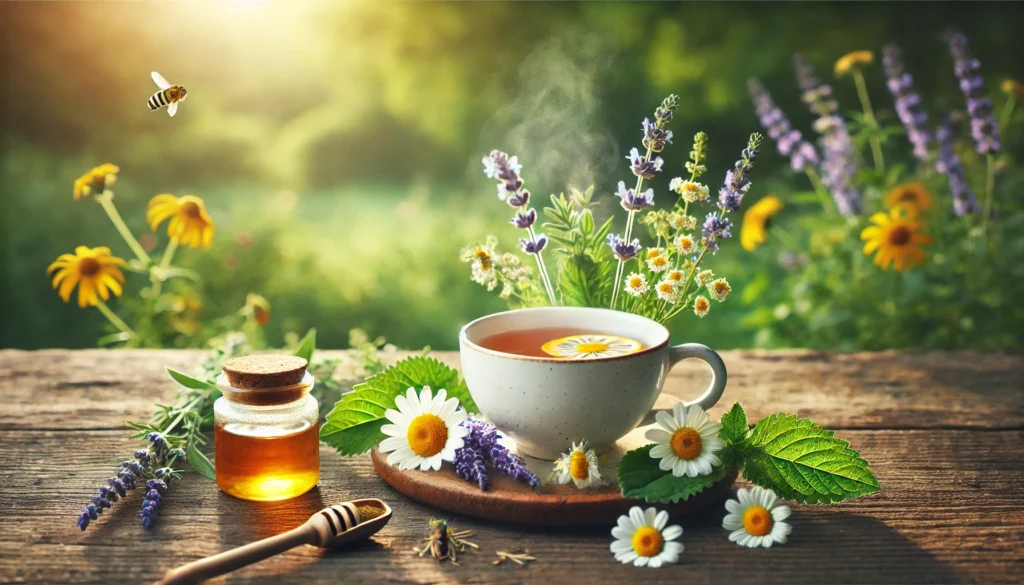Understanding Generalized Anxiety Disorder: A Holistic Perspective
Generalized Anxiety Disorder (GAD) is a persistent and often overwhelming condition that affects millions of individuals across the globe. Characterized by chronic worry, tension, and apprehension, GAD disrupts daily life in ways that can be difficult for those unaffected to fully grasp. People living with this condition often experience excessive anxiety even when there is no obvious source of concern. The anxiety is not tied to one specific event or situation, making it challenging to identify triggers or avoid stressful environments altogether.
You may also like: Best Herbal Alternatives to Anxiolytics: Natural Remedies for Anxiety Relief
While conventional interventions such as psychotherapy and pharmacological options remain at the forefront of generalized anxiety disorder treatments, there is growing interest in integrative approaches. Individuals are increasingly exploring how herbal supplements, mindfulness practices, and lifestyle adjustments might work alongside therapy for generalized anxiety disorder to enhance results and improve quality of life. In doing so, they are not looking to replace traditional care, but rather to reinforce it with natural methods that support the nervous system and foster resilience.
Recent scientific inquiries have illuminated the mind-body connection in the experience and treatment of anxiety. Chronic stress and dysregulation of the hypothalamic-pituitary-adrenal (HPA) axis are now recognized as physiological underpinnings of many anxiety-related disorders. This has spurred a surge of interest in adaptogens—herbs known for their ability to help the body adapt to stress. A deeper understanding of the potential synergy between such remedies and conventional gad therapy is not only compelling but essential for those seeking personalized, whole-person care.
From a holistic standpoint, treating GAD effectively requires addressing not just neurotransmitter imbalances but also diet, sleep, environment, and emotional habits. As a result, the best treatment for GAD may vary from one person to another, and a truly supportive strategy must remain flexible, evidence-informed, and respectful of each individual’s unique physiology. The integration of herbal remedies with conventional treatments could hold the key to achieving this level of customization.
In this article, we will explore how natural remedies—especially herbs and adaptogens—may offer a meaningful complement to established GAD treatment strategies. We’ll examine what current science tells us, how these supplements can be used safely, and what to consider when looking for the best treatment for anxiety in a modern world where stress is inescapable but not unmanageable.

The Foundation of GAD Treatment: Conventional Approaches
Understanding the conventional approach to GAD treatment provides the necessary context for integrating complementary therapies. Standardized treatment options often begin with cognitive-behavioral therapy (CBT), which helps patients identify maladaptive thought patterns and learn more productive coping strategies. CBT remains a cornerstone of therapy for generalized anxiety disorder because it addresses both the cognitive and behavioral dimensions of worry and fear.
Pharmacological interventions are also widely used. Gad medications, particularly selective serotonin reuptake inhibitors (SSRIs) like sertraline and paroxetine, are among the most common prescriptions. Other drugs for generalized anxiety disorder include serotonin-norepinephrine reuptake inhibitors (SNRIs), benzodiazepines, and buspirone. These medications target neurotransmitter systems involved in mood regulation, and while they can be highly effective, they often come with side effects ranging from gastrointestinal discomfort to sexual dysfunction or sedation.
The question of the best medication for GAD is not easily answered. What works for one person may not work for another due to variations in genetics, metabolism, and coexisting health conditions. Even with the best medication for generalized anxiety, some patients report residual symptoms or feel disconnected from their emotional experiences due to medication effects. These limitations have fueled the search for adjunctive solutions that may offer additional relief without further complicating the treatment plan.
Moreover, many individuals seek alternatives due to concerns about dependency or long-term use, particularly with benzodiazepines. While these medications provide rapid relief, they are not recommended for long-term treatment due to the risk of tolerance and withdrawal symptoms. Consequently, the notion of supporting conventional treatment with herbal medicine is gaining momentum, particularly among those who prefer a more natural or preventative approach.
Despite the wide array of gad drugs and established therapies, treatment for generalized anxiety is often most successful when it takes into account the whole person. Integrating natural remedies may enhance therapeutic outcomes, helping individuals build emotional resilience, balance their nervous systems, and reduce the overall burden of symptoms in a sustainable way.

Herbal Remedies and Adaptogens: A Natural Ally in GAD Management
Herbs and adaptogens have long played a role in human wellness practices, and their potential to assist in GAD treatment is now being backed by emerging scientific research. Adaptogens such as ashwagandha, rhodiola, and holy basil have demonstrated the ability to regulate cortisol levels and promote a sense of calm. These properties are particularly relevant for those managing anxiety, given the strong association between stress hormones and anxiety symptoms.
Ashwagandha, a staple in Ayurvedic medicine, has been studied extensively for its anxiolytic effects. Clinical trials have found that it can significantly reduce cortisol levels and improve resilience to stress. For individuals seeking alternatives or additions to conventional gad medications, ashwagandha may offer a gentle yet effective tool for managing symptoms. Its low side-effect profile and adaptogenic properties make it a compelling option when considering how to relieve GAD using natural means.
Rhodiola rosea is another powerful adaptogen, known for its ability to enhance physical and mental performance under stress. It is believed to act on the central nervous system, supporting neurotransmitters such as dopamine and serotonin. In randomized clinical trials, rhodiola has shown promise in reducing symptoms of anxiety and depression, particularly in individuals with stress-related fatigue. As part of a broader generalized anxiety therapy plan, rhodiola can help regulate emotional responses and improve energy without overstimulation.
Holy basil, or tulsi, offers both anti-anxiety and anti-inflammatory benefits. It has been used traditionally to support the immune system and balance the body’s stress response. Modern research supports its calming effects, with some studies noting reductions in anxiety comparable to diazepam, though with far fewer side effects. For individuals exploring holistic options for how to treat generalized anxiety disorder, holy basil stands out as a multipurpose herb that nurtures both body and mind.
These herbs are not magic bullets, and they work best when incorporated into a thoughtful and consistent routine. However, when combined with therapy for generalized anxiety disorder, they may offer a more robust and sustainable healing process. Understanding how each herb interacts with the body’s stress-response systems allows individuals to make informed decisions, and consulting with a healthcare provider familiar with both pharmacology and herbal medicine is critical for safety and efficacy.
Frequently Asked Questions: Herbal Support for Generalized Anxiety Disorder (GAD)
1. Can herbal remedies replace prescription medications for GAD?
While some individuals may find significant relief from herbal remedies, replacing prescription gad medications outright is not recommended without medical supervision. Herbal supplements can support gad therapy by reducing stress and enhancing mood regulation, but they typically work more gradually than gad drugs like SSRIs or benzodiazepines. In certain cases, herbs like ashwagandha or passionflower may complement the effects of medication for generalized anxiety disorder gad, potentially allowing for lower dosages. However, abrupt discontinuation of pharmaceutical treatments may lead to withdrawal symptoms or a resurgence of anxiety. The best course of action is to consult a generalized anxiety disorder doctor to explore integrative strategies tailored to your needs.
2. What role does nutrition play in optimizing the best treatment for GAD?
A nutrient-dense diet plays a vital, though often overlooked, role in the success of any generalized anxiety therapy plan. Micronutrient deficiencies—particularly in magnesium, B vitamins, and omega-3 fatty acids—have been linked to increased anxiety symptoms. Integrating these nutrients can enhance the body’s ability to respond to gad medicine and support emotional regulation. In this context, nutrition can be an essential layer of the best treatment for anxiety, helping individuals achieve better baseline health for more effective responses to gad treatment. While food alone may not be the best treatment for GAD, it significantly boosts the impact of therapeutic and herbal interventions.
3. Are there any emerging herbal remedies that show promise in treating GAD?
Several lesser-known herbs are beginning to garner attention as potential adjuncts in treatment for generalized anxiety. One such herb is kanna (Sceletium tortuosum), which has been traditionally used in South Africa for mood support and may influence serotonin uptake similarly to gad medications. Another is saffron, which contains compounds that may promote calm and improve mood regulation. Though not yet considered a best medication for generalized anxiety, these herbs may eventually play a more prominent role in generalized anxiety disorder treatments as more clinical data emerges. Continued research is critical to ensure safety, proper dosing, and effectiveness when used alongside conventional gad drugs.
4. How does GAD affect sleep, and can herbs improve both?
Sleep disturbances are a common consequence of GAD and can significantly undermine recovery. Chronic worry and a hyperactive stress response can impair the production of melatonin and disrupt circadian rhythms. Fortunately, several herbs that support gad anxiety treatment—such as valerian root, lemon balm, and chamomile—also promote restful sleep. When combined with therapy for generalized anxiety disorder, these herbs may improve both daytime and nighttime symptom profiles. This dual benefit is especially valuable for those exploring how to relieve GAD holistically and restore a healthy sleep-wake cycle.
5. What psychological therapies pair best with herbal remedies for GAD?
Cognitive-behavioral therapy (CBT) remains the gold standard, but other modalities like Acceptance and Commitment Therapy (ACT) and mindfulness-based stress reduction (MBSR) also integrate well with herbal approaches. These methods cultivate present-moment awareness and emotional regulation, which aligns with the calming effects of herbs like holy basil and lavender. When psychological tools are used in tandem with gad medicine, the mind-body connection becomes more deeply engaged. This integrative model may be especially effective in long-term gad treatment and can even reduce reliance on gad medications over time. Finding the right therapeutic approach may involve trial and error, but herbal supplements can enhance the benefits of all these modalities.
6. Is there a risk of interaction between herbal supplements and prescription gad drugs?
Yes, some herbs may interact with drugs for generalized anxiety disorder, particularly those that influence neurotransmitter systems. For instance, St. John’s Wort is known to interfere with SSRIs, potentially causing serotonin syndrome. It is essential to discuss any herbal regimen with a generalized anxiety disorder doctor to ensure compatibility with prescribed gad medications. Additionally, some herbs may impact liver enzymes that metabolize gad drugs, affecting their efficacy or increasing side effects. Responsible use of herbal remedies involves transparency with healthcare providers and careful integration into one’s generalized anxiety therapy plan.
7. Can herbal remedies support long-term prevention of anxiety relapse?
Herbal remedies may be especially helpful in maintaining emotional balance after acute symptoms have stabilized. Adaptogens like rhodiola and eleuthero can enhance resilience to future stress, reducing the likelihood of relapse. While not typically classified as the generalized anxiety disorder best medication, these herbs may help prevent stress reactivity that often leads to symptom recurrence. Combined with ongoing gad therapy and healthy lifestyle practices, they offer a proactive solution for those wondering how to treat generalized anxiety disorder over the long term. Preventative care is a cornerstone of integrative mental health and may reduce future dependence on gad medicine.
8. How does one know when herbal treatment is working for their GAD?
Tracking subtle changes in emotional response, energy levels, and sleep quality over several weeks is key to gauging herbal effectiveness. Unlike gad medications, which often come with noticeable side effects or rapid changes, herbal treatments tend to offer gradual, cumulative benefits. Journaling daily stress levels, physical symptoms, and coping abilities can help individuals recognize progress. Herbal success is not solely defined by the absence of anxiety but also by improved adaptability, focus, and mood stability. When paired with consistent treatment for generalized anxiety, these natural aids often reveal their power through subtle but meaningful shifts.
9. Are there specific populations for whom herbal GAD treatment is especially beneficial or risky?
Herbal approaches may be particularly useful for individuals who are sensitive to pharmaceutical side effects or those who have mild to moderate symptoms and prefer non-pharmaceutical interventions. However, pregnant individuals, those with autoimmune disorders, or people on multiple medications should exercise caution. Not all herbs are safe for all bodies, and certain populations may experience adverse effects even at low doses. Consulting a generalized anxiety disorder doctor with training in integrative medicine is the best way to personalize your gad anxiety treatment strategy. Understanding one’s medical history and risk factors is essential to deciding how to safely explore how to treat GAD naturally.
10. What does the future look like for natural and integrative GAD treatment options?
The future of generalized anxiety disorder treatments appears to be increasingly interdisciplinary. Researchers are exploring the microbiome’s role in mental health, suggesting that herbal prebiotics and gut-targeting botanicals could shape the next wave of natural interventions. Personalized medicine, including genetic testing to determine which best meds for GAD work best for specific individuals, may soon integrate herbal profiles and metabolic markers. Technology-assisted tracking apps could also play a role in monitoring the effects of herbal and pharmaceutical gad treatment in real-time. With a greater emphasis on patient-centered care, we can expect more synergy between traditional medicine and nature-based solutions in addressing how to cure generalized anxiety safely and sustainably.

A Holistic Path Forward: Integrating Herbal Remedies with Therapy for Long-Term GAD Relief
In the complex and often deeply personal journey of managing generalized anxiety disorder, it has become increasingly clear that a multifaceted approach offers the greatest potential for healing. While conventional interventions like cognitive-behavioral therapy and pharmacological options remain foundational, they are not always sufficient to address the emotional, physiological, and lifestyle dimensions of chronic anxiety. As a result, more individuals are discovering that the best treatment for GAD may not lie in a single method, but rather in the thoughtful integration of established clinical care with holistic support systems—including herbal remedies and adaptogens.
natural anxiety remedies, calming herbal supplements, adaptogens for stress relief, holistic mental health support, herbal support for mood, plant-based anxiety solutions, integrative mental health care, natural stress management, anti-anxiety herbs, ashwagandha for anxiety, rhodiola for mood support, holy basil benefits, natural ways to ease worry, complementary anxiety therapies, emotional wellness herbs, botanical mood enhancers, stress-reducing herbs, alternative treatments for anxiety, herbal approaches to mental health, mind-body anxiety relief
Further Reading:
Herbal treatment for anxiety: Is it effective?
How to treat anxiety naturally
Disclaimer
The information contained in this article is provided for general informational purposes only and is not intended to serve as medical, legal, or professional advice. While NewsHealthWatch strives to present accurate, up-to-date, and reliable content, no warranty or guarantee, expressed or implied, is made regarding the completeness, accuracy, or adequacy of the information provided. Readers are strongly advised to seek the guidance of a qualified healthcare provider or other relevant professionals before acting on any information contained in this article. NewsHealthWatch, its authors, editors, and contributors expressly disclaim any liability for any damages, losses, or consequences arising directly or indirectly from the use, interpretation, or reliance on any information presented herein. The views and opinions expressed in this article are those of the author(s) and do not necessarily reflect the official policies or positions of NewsHealthWatch.

